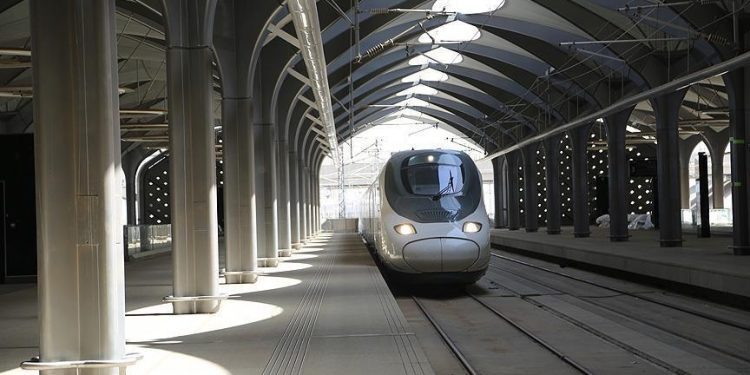- Standard Gauge Railway electric train, a project worth nearly $2 billion, has been built by Turkish company Yapi Merkezi
- Train is part of a wider regional initiative to connect DR Congo and landlocked countries like Rwanda, Burundi and Uganda to Tanzania’s key port of Dar es Salaam
DAR ES SALAAM, Tanzania
With a shimmering facade of sky-blue glass panels, the Standard Gauge Railway Station in Tanzania’s commercial hub Dar es Salaam looks more like an opulent airport terminal than a railway facility.
Inside, a maze of escalators gracefully glides passengers to various levels, offering a panoramic view of the bustling terminal below.
This architectural marvel, meticulously designed with passengers’ comfort in mind, boasts state-of-the-art ticketing counters and plush waiting lounges equipped with charging ports and other amenities.
The station serves the Standard Gauge Railway (SGR) electric train built by Turkish company Yapi Merkezi, a project that represents a significant leap forward for the East African nation’s transportation infrastructure.
The electric train, a project worth nearly $2 billion, is seen as an immense boost to domestic connectivity, trade and economic opportunities with neighboring landlocked countries like Uganda and Rwanda.
The SGR’s entire route will run from Dar es Salaam to Mwanza, a port city on the shore of Lake Victoria, and Kigoma, a city on the northeastern shores of Lake Tanganyika, near the border with Burundi and the Democratic Republic of the Congo.
That route will cover a total of nearly 1,300 kilometers (around 810 miles).
For now, the section completed is from Dar es Salaam to the capital Dodoma, running approximately 460 kilometers (285 miles), which will be officially inaugurated on July 1.
The SGR is also part of a wider regional initiative known as the Central Corridor, which aims to connect DR Congo and landlocked countries like Rwanda, Burundi, Uganda to Tanzania’s key port of Dar es Salaam.
‘Historic moment’
A few weeks ago, a group of officials and dignitaries, including Prime Minister Kassim Majaliwa, were given a trial run.
Majaliwa hailed it as a “historic moment” for the nation, saying the electric rail will reduce traveling time for people, boost trade connectivity and help in environmental conservation efforts.
The journey aboard the SGR is a stark departure from the chaotic rides of the past. No longer will passengers endure slow and noisy journeys, gliding instead now glide at an average speed of 74 miles per hour.
In the passenger coaches, there are 45 seats designated as business class and 78 seats as economy, both decked out with facilities to make travel easy and accessible.
On the cargo front, the train has carriages designed to carry 22 million tons of cargo annually.
Masanja Kadogosa, director general of the Tanzania Railway Corporation, spoke about the strict safety standards for the SGR, saying detailed technical tests have been carried out to ensure the most efficient operations.
“This is one of the best investments for our nation. It will prove very important for the economy,” beamed Ibrahim Mkotya, a Dar es Salaam resident.
“I only wish this same contractor is awarded another tender to complete this entire railway line.”







